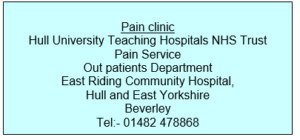- Reference Number: HEY-576/2023
- Departments: Pain Medicine
- Last Updated: 1 March 2023
Introduction
This leaflet has been produced to give you general information about your treatment. Most of your questions should be answered by this leaflet. It is not meant to replace the discussion between you and the healthcare team, but may act as a starting point for discussion. If after reading it you have any concerns or require further explanation, please discuss this with a member of the healthcare team.
What is acupuncture?
Western medical acupuncture is a therapeutic treatment involving the insertion of fine, sterile needles, which was adapted from Chinese acupuncture and uses current knowledge of anatomy, physiology and pathology as well as evidence based practice. Hull University Teaching Hospitals acupuncture service combines both western medical and Chinese acupuncture.
Acupuncture is thought to work by releasing endorphins, (the body’s natural pain-killing chemicals) and also the release of chemicals which increase blood flow to an area to promote healing. Other chemicals, such as serotonin help to elevate mood and reduce pain.
Acupuncture will be performed by nurses that have undertaken special training.
Why do I need acupuncture?
A member of the healthcare team has recommended that you receive a course of acupuncture for pain relief. If effective, the ten session course will involve treatment every one to two weeks for the first six sessions initially, then once every six to eight weeks. At the end of this course you will be reviewed by your pain consultant or discharged back to your GP.
Acupuncture is not a cure but it is a treatment that can help to relieve pain. The effect of acupuncture differs for each person and does not necessarily help all those suffering with pain. The amount of pain relief may vary from person to person. Ideally, the acupuncture should help you to engage in some form of exercise or activity which will help you to manage your pain long-term.
Can there be any complications or risks?
The risks associated with acupuncture are minimal. They can include:
- Bruising
- Nausea or sickness
- Dizziness / fainting
- Drowsiness / tiredness
- Temporary increase in pain
- Allergies / infection
- May increase or decrease blood sugar levels
How do I prepare for the acupuncture?
No preparation is required, but it is important to tell the nurse if you are pregnant, diabetic, epileptic, have a blood disorder or take blood thinning medication. Ensure that you have had something to eat before attending acupuncture especially if you have diabetes. The nurse may refuse to treat you if you have not eaten.
What will happen?
At your first appointment a nurse will explain the treatment. You will be asked to complete a short questionnaire regarding your current pain level and activities, this will be repeated at the fourth session to evaluate the effect of your treatment. You will be asked to sign a consent form. You will be placed in a private area. You may be asked to remove or loosen some of your clothes to allow the nurse to treat the affected area. The nurse will select the acupuncture points and insert needles. It is normal to experience a sensation of stinging or dull ache during your treatment. The needles are left in for approximately 20 minutes. Once the treatment is complete the needles are destroyed.
What happens afterwards?
You are given an appointment for the next session or if you have completed the course, you will be given an appointment to be reviewed by your doctor or nurse.
You may feel tired after the treatment. This should not affect your ability to drive or operate machinery. If you find that this is a problem, please ensure you are escorted to and from the department by a relative or friend.
The information in this leaflet is not intended to replace your doctor’s advice. If you require more information or have any questions please speak to your doctor or contact the Pain Clinic.

In the event of an emergency and outside normal working hours
(9.00am – 4.00pm) of the Pain Clinic please contact your own GP
This leaflet was produced by the Pain Management Service, Department, Hull University Teaching Hospitals NHS Trust and will be reviewed in March 2026
General Advice and Consent
Most of your questions should have been answered by this leaflet, but remember that this is only a starting point for discussion with the healthcare team.
Consent to treatment
Before any doctor, nurse or therapist examines or treats you, they must seek your consent or permission. In order to make a decision, you need to have information from health professionals about the treatment or investigation which is being offered to you. You should always ask them more questions if you do not understand or if you want more information.
The information you receive should be about your condition, the alternatives available to you, and whether it carries risks as well as the benefits. What is important is that your consent is genuine or valid. That means:
- you must be able to give your consent
- you must be given enough information to enable you to make a decision
- you must be acting under your own free will and not under the strong influence of another person
Information about you
We collect and use your information to provide you with care and treatment. As part of your care, information about you will be shared between members of a healthcare team, some of whom you may not meet. Your information may also be used to help train staff, to check the quality of our care, to manage and plan the health service, and to help with research. Wherever possible we use anonymous data.
We may pass on relevant information to other health organisations that provide you with care. All information is treated as strictly confidential and is not given to anyone who does not need it. If you have any concerns please ask your doctor, or the person caring for you.
Under the General Data Protection Regulation and the Data Protection Act 2018 we are responsible for maintaining the confidentiality of any information we hold about you. For further information visit the following page: Confidential Information about You.
If you or your carer needs information about your health and wellbeing and about your care and treatment in a different format, such as large print, braille or audio, due to disability, impairment or sensory loss, please advise a member of staff and this can be arranged.

